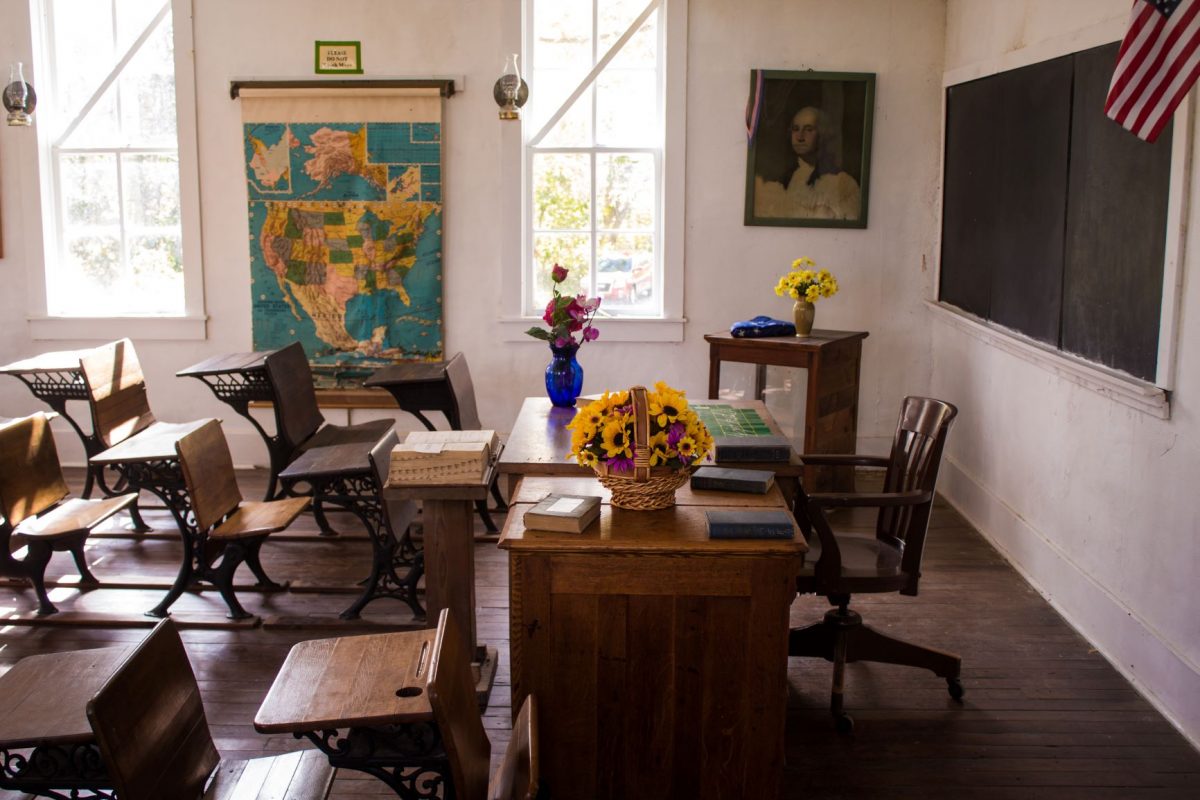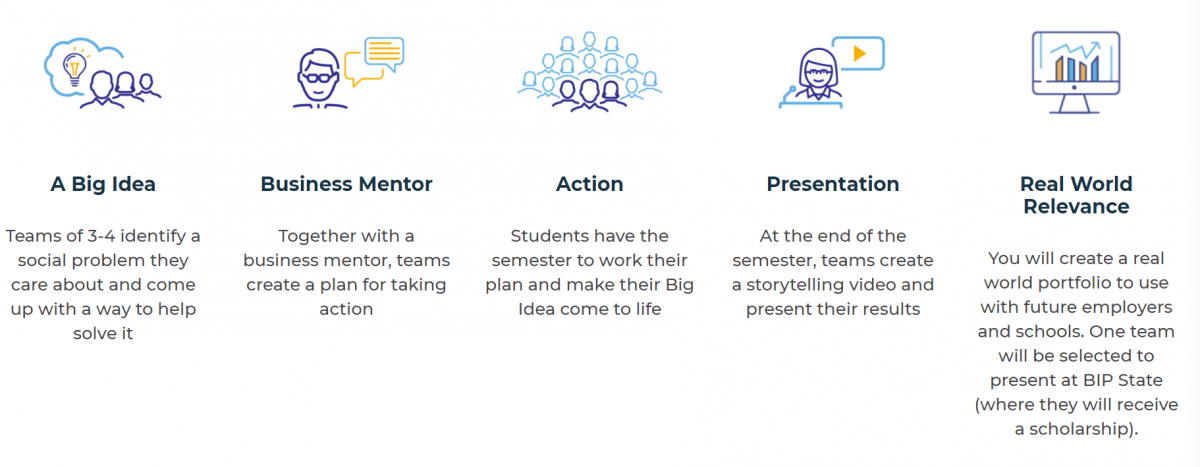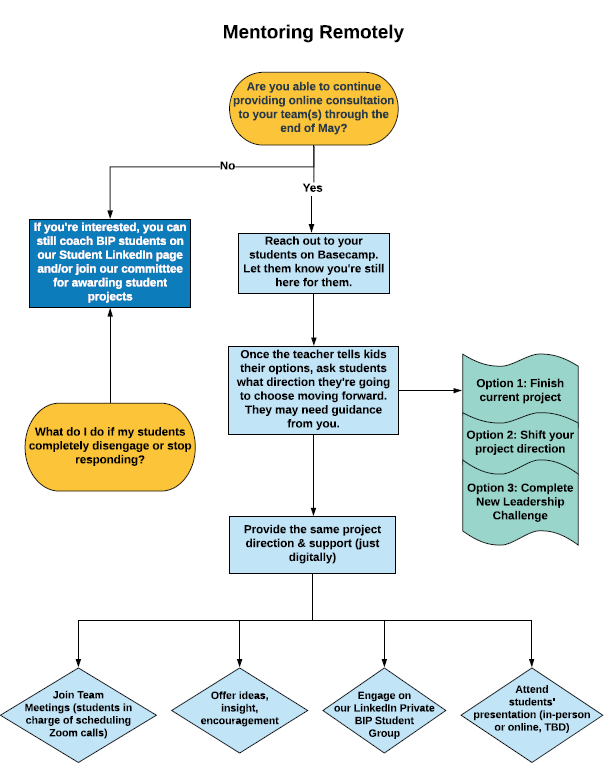Adaptation in Evaluation: Pressures and Progress in a Time of COVID-19
5/4/20 / Caitlin McAteer

Amidst rising efforts to slow the spread of COVID-19, Governor Polis closed Colorado schools on March 18th. In the weeks leading up to the 18th, much of the state was holding its breath to see what would happen. While many organizations have frozen in place due to the implications of the COVID-19 pandemic, one of our long-term clients, Big Idea Project, has exemplified how to be proactive during this time of uncertainty. When faced with impending school closures, Big Idea Project got to work modifying its program implementation This proactive problem-solving work that now ensures the program’s resiliency isn’t entirely surprising when one considers how Big Idea Project’s aim to empower young Coloradans to solve big problems.

In an education environment where most curriculum is standards-centered, Big Idea Project provides “a student-centered approach that connects the head and the heart through experiential learning, resulting in personal development that goes beyond knowledge.”, Big Idea Project builds leadership, workforce readiness, social-emotional skills, and well-being through a unique model that combines service learning, mentorship with working professionals, and classroom engagement.
During any typical semester, Big Idea Project helps teams of students to identify an issue in their community, work together with the help of mentors to propose a solution, and then to implement their project plan. Through this process, “[Students] learn skills such as responsibility, communication and project management. They recognize what it means to care for themselves and others. They recognize their value and find meaning in their work.” Here, the goal is to “provide schools with a comprehensive leadership development program that goes beyond academic skills to meet the needs of the whole student, equipping them for life beyond the classroom.”

However, the spring semester of 2020 has been far from typical. Rather than ending engagement because of a new inability for students to physically enter their communities and solve problems, Big Idea Project focused adaptation through use of technology. With an impressive number of Zoom calls, Big Idea Project leadership worked with affiliated teachers to determine promising courses of action. By the time schools moved to online instruction, Big Idea Project was already prepared with an innovative solution for remote programming for its high school students. As a result, Big Idea Project enabled the continued engagement of mentors through facilitated Zoom calls with students and permitted student teams to decide one of three possible pathways for continuing their project while adhering to social distancing recommendations. As Tricia explains in a blog titled “Shaken” on the Big Idea Project Website,
“Since the COVID-19 closures, Big Idea Project has been leading responsive solutions for schools and anticipating changes at a rapid speed. In less than a week after learning about “extended spring breaks,” Big Idea Project had ideated a semester-long solution, developed full curriculum, written teacher guides, set up platforms, and rolled out program-wide training webinars to nearly 200 teachers, mentors and school coordinators.”
As if it weren’t enough to have to modify program implementation on very short notice, Big Idea Project also faced the challenge of what to do with its program evaluation efforts. In a typical year, Big Idea Project requires a complex evaluation system that gauges various outcomes among students, teachers, school coordinators, and mentors while also accounting for programmatic differences as implementation across schools looks slightly different. However, due to program changes in response to COVID-19, Big Idea Project had to decide whether they would continue with evaluation efforts that no longer matched the current reality of program implementation.
In taking a daring leap and quickly modifying its evaluation framework, Big Idea Project, under the leadership of Tricia Halsey, decided to adapt evaluation instruments and tell a narrative of resilience, innovation, and adaptability in the face of adversity. New evaluation efforts aim to:

- Assess how BIP’s emphasis on social-emotional learning had a positive impact on the lives of stakeholders during this time of uncertainty,
- Measure BIP’s capacity to customize and tailor offerings to needs of a school, climate, learning environment, level of engagement (classroom, department, school leadership, district), and
- Determine BIP’s role during this time as a partner in education rather than a vendor offering a service in a transaction/handoff format
Big Idea Project is still in the process of wrapping up program implementation and assessing program outcomes and impacts for Spring 2020. However, aspirational as always, the organization looks forward to harnessing the power of a unique reflection opportunity and facilitating more conversations within the space of education reform using its collected evaluation data. Emphatically, Tricia Halsey of Big Idea Project explains that, “This is not the time to throw in the towel and wait it out. It is our responsibility, and yours, to invite young people to shake off the dust, remember why they learn, and actively engage in the current challenge so that they become the leaders they are meant to be.”
In a true Big Idea Project fashion, we as evaluators must remember that there is still something valuable to learn even if things didn’t go as planned. With an emergent evaluation strategy, we can still draw valuable lessons and make important progress. It may just require a little ingenuity and a willingness to return to the drawing board.
“As humans, we do not change and grow when times are easy. We grow in the midst of challenge, but only if we choose to respond rightly.”
Tricia Halsey
Co-Founder and Executive Director of Big Idea Project